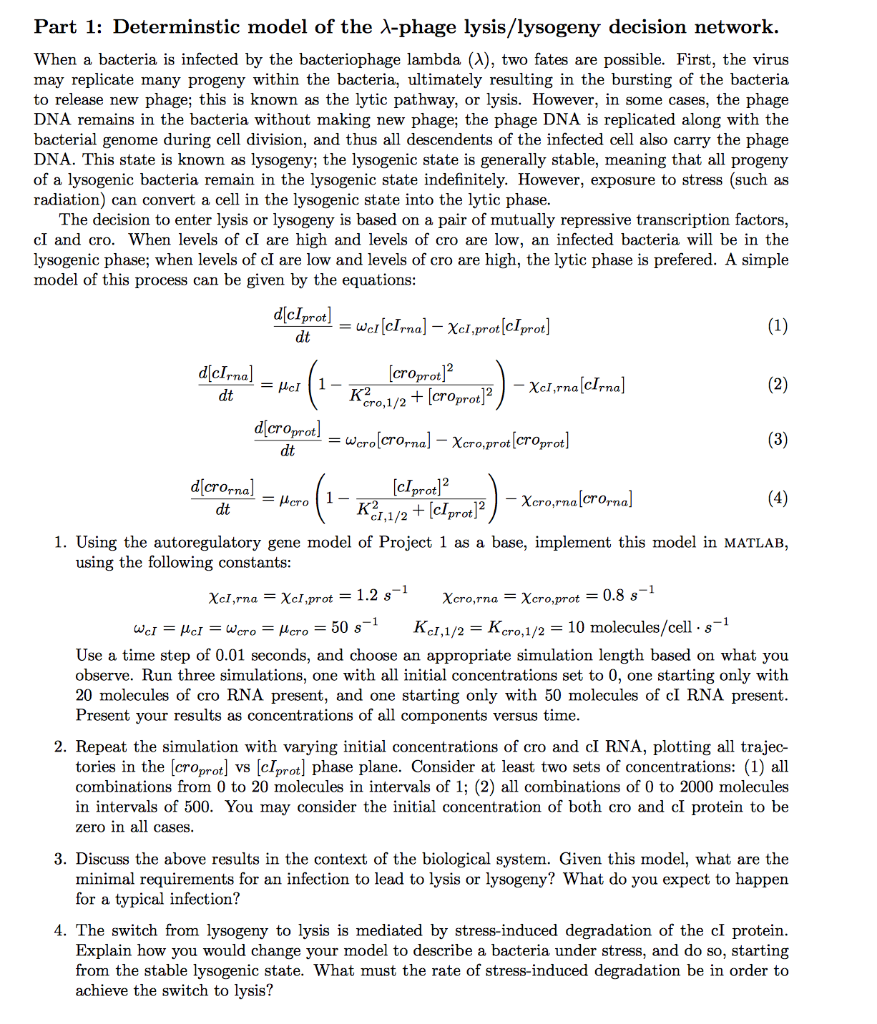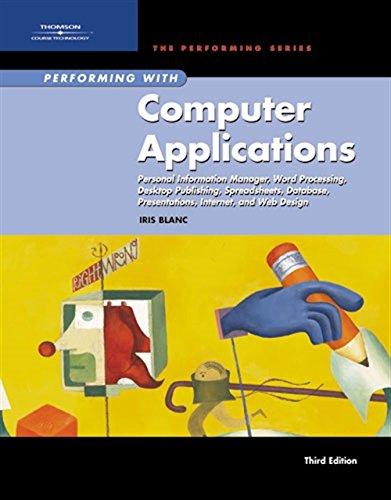question2 Repeat the simulation with varying initial concentrations of cro and cI RNA, plotting all trajectories in the [croprot] vs [cIprot] phase plane. Consider at least two sets of concentrations: (1) all combinations from 0 to 20 molecules in intervals of 1; (2) all combinations of 0 to 2000 molecules in intervals of 500. You may consider the initial concentration of both cro and cI protein to be zero in all cases.

Part 1: Determinstic model of the l-phage lysis/lysogeny decision network. When a bacteria is infected by the bacteriophage lambda (~), two fates are possible. First, the virus may replicate many progeny within the bacteria, ultimately resulting in the bursting of the bacteria to release new phage; this is known as the lytic pathway, or lysis. However, in some cases, the phage DNA remains in the bacteria without making new phage; the phage DNA is replicated along with the bacterial genome during cell division, and thus all descendents of the infected cell also carry the phage DNA. This state is known as lysogeny; the lysogenic state is generally stable, meaning that all progeny of a lysogenic bacteria remain in the lysogenic state indefinitely. However, exposure to stress (such as radiation) can convert a cell in the lysogenic state into the lytic phase. The decision to enter lysis or lysogeny is based on a pair of mutually repressive transcription factors, cI and cro. When levels of cl are high and levels of cro are low, an infected bacteria will be in the lysogenic phase; when levels of cl are low and levels of cro are high, the lytic phase is prefered. A simple model of this process can be given by the equations: d[ci prot] = wcIcIrna] Xci,prot[cIprot] (1) dt d{cIrna) = MCI dt (1 (2) (croprot] - Xcl rna (cIrna] K 70,1/2 + (croprot] Wcro [crorna] Xero,prot (croprot] d[croprot] dt (3) (1- d[crorna [cI prot)? = Xero,rna (crorna] dt K21,1/2 + (cIprot] 1. Using the autoregulatory gene model of Project 1 as a base, implement this model in MATLAB, using the following constants: Xcl rna = XcI prot = 1.2 s-1 Xcrorna = Xcro,prot = 0.8 s-1 WcI = McI = Wcro = Mere = 50 s-1 Kc1,1/2 = Kcr0,1/2 = 10 molecules/cell-s-1 Use a time step of 0.01 seconds, and choose an appropriate simulation length based on what you observe. Run three simulations, one with all initial concentrations set to 0, one starting only with 20 molecules of cro RNA present, and one starting only with 50 molecules of cI RNA present. Present your results as concentrations of all components versus time. 2. Repeat the simulation with varying initial concentrations of cro and cl RNA, plotting all trajec- tories in the (croprot] vs (CI prot] phase plane. Consider at least two sets of concentrations: (1) all combinations from 0 to 20 molecules in intervals of 1; (2) all combinations of 0 to 2000 molecules in intervals of 500. You may consider the initial concentration of both cro and cl protein to be zero in all cases. 3. Discuss the above results in the context of the biological system. Given this model, what are the minimal requirements for an infection to lead to lysis or lysogeny? What do you expect to happen for a typical infection? 4. The switch from lysogeny to lysis is mediated by stress-induced degradation of the ci protein. Explain how you would change your model to describe a bacteria under stress, and do so, starting from the stable lysogenic state. What must the rate of stress-induced degradation be in order to achieve the switch to lysis







